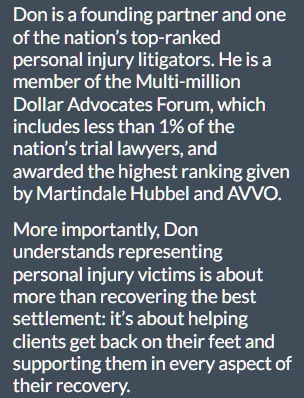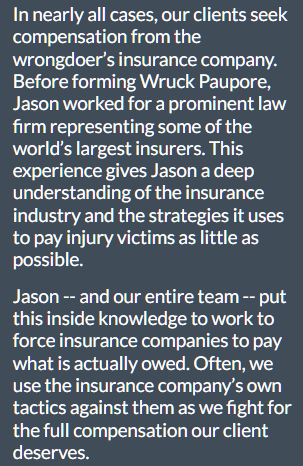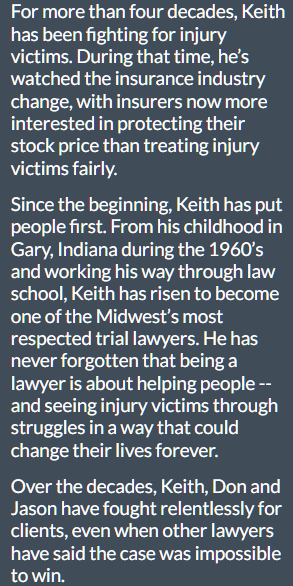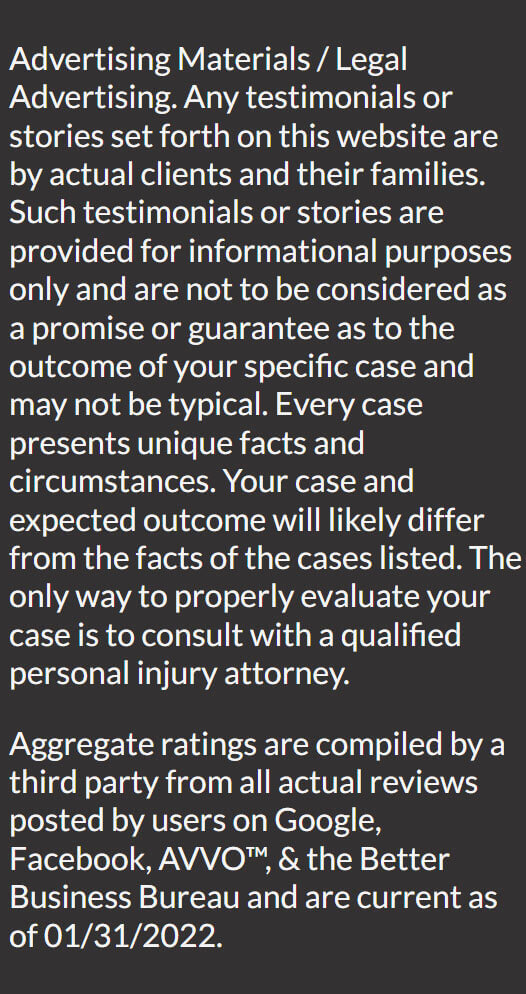




Insurance companies may treat you unfairly by using the “Triple D” tactic known as “Delay, Deny, and Defend.” With this approach, the insurance adjuster will avoid contacting an injury victim. The insurance adjuster may claim that the insurance company did not receive information on the victim's claim, or just not respond in a timely manner. An injury victim may become so worn out dealing with this runaround that they will accept an insurance settlement for less than what they are owed. If the injury victim doesn’t accept a low settlement, the insurer may then require the victim to file a lawsuit before offering a fair settlement. This tactic can not only result in an insurance victim accepting less than they are owed, but it can also result in accident victims losing their rights altogether if the statute of limitations times out.
For this reason, it is very important that you seek immediate legal advice if you have been injured in a car accident so that you know your rights – even if you don’t ultimately hire a lawyer to represent you. The South Bend car accident lawyers at Wruck Paupore Injury Lawyers can give you honest and straightforward legal information, as well as defend your best interests against insurance companies who are only out to protect their profit.
After an accident, follow these steps to protect your rights to compensation:
Never leave the scene of an accident. If you are conscious and can do so without further injuring yourself, take as many photos as possible.
Check to see if there are any injuries to those involved in the accident. Call 911 immediately if medical attention is needed. Make sure that the police have made a report of the accident. Police reports are useful for determining fault and negligence.
Talk to anyone who may have witnessed the accident. Take down names, contact information, and any other information or details they can provide. Take as many pictures and videos of the accident scene if you are in a condition to do so.
Do not delay or avoid obtaining medical care. Insurance companies will use any delay in obtaining medical care as a possible excuse for not paying the fair value of your claim. Even if you do not feel like you have been injured, it is better to be treated and released immediately than to find out that you are hurt later.
Do not wait until it is too late to file your insurance claim. Failing to report your accident could result in an insurance company not covering you for the accident. To preserve claims against your own insurer, you may need to provide notice of your claim long before the statute-of-limitations expires.
It is important to visit your doctor after an injury, even if you are unsure if you have been injured. Make sure to explain exactly how the accident occurred, and mention any injury or pain you have suffered as a result. Follow all of the advice given by your medical provider and take all the medication prescribed to you. If you do not, the insurance company is likely to use this against you to avoid paying the full value of your claim. If you must miss a doctor's appointment, document a legitimate reason why.
Immediately report the accident to your own insurance company. Failing to do so could result in the insurance company not covering you for the accident. However, if dealing with an insurance adjuster, do not sign or admit to anything. We recommend that you never talk to the insurance adjuster without first talking to a qualified injury lawyer.
The most common documents which an insurer may send you are medical releases and proposed settlement agreements. You should not sign either without legal advice. These releases and agreements are legal documents that may require you to give up legal rights if you sign them. Do not sign any document provided to you by an insurance company without first having it reviewed by a lawyer.
You may be asked by an insurance company to provide a written or recorded statement about the circumstances of your accident. An insurance representative will attempt to obtain this statement shortly after the injury – before the injury victim has talked to a lawyer.
Before agreeing to give a recorded statement, ask yourself this question – why does the insurance company want to record the call? The simple answer is so that it can be used against you at a later time. If it is already clear who is at fault, why does the insurance company need a recorded statement? The insurance adjuster can ask questions during this recorded statement which may be designed to confuse you – even if those questions would not be allowed to be asked in court. These statements can result in costly mistakes which an insurance company may use to avoid paying what it owes you.
For these reasons, you should always talk to an injury lawyer for guidance before giving any statement to an insurance adjuster. If you do give a statement, you should do so only in the presence of your attorney who can make certain that all of the questions are fair.
One of the most common strategies used by insurance companies to avoid paying accident victims the full amount owed is the “quick settlement” approach. If an insurance company senses that an accident victim is facing financial pressures such as mounting medical bills, they may aggressively try to reach a quick settlement for a lower amount.
An insurance company using the “quick settlement” tactic may have a claims adjuster contact you very soon after your accident, sometimes even before you have filed a claim. This is when accident victims are often most vulnerable. You may still be adjusting to the physical and emotional impact of the accident and you might be under a lot of pressure due to lost work time and expensive medical bills. If you do not have health insurance, you might also be having difficulty even getting all the medical attention you require.
If you accept this money, the insurer will usually require you to sign a release of all of your rights which will prevent you from recovering anything else in the future even if you later discover severe problems arising from your accident.
If you recover money for your injury claim, there is a very complicated set of rules for when your health insurers need to be paid back out of the settlement for money they paid for your medical care. This depends, in part, on the type of medical plan involved. Some of these plans will frequently compromise the amount that needs to be paid back to them out of a settlement if you have skilled legal representation.
There are generally three categories of medical coverage plans: Private Plans, Employer-Sponsored Plans, and Medicare/Medicaid coverage. Injury victims may experience problems obtaining proper payment for their medical bills with any of these plans.
Direct plans are health care plans which are paid for directly by the injury victim, the injury victim’s family, or someone else on the injury victim’s behalf. These are different from plans which are sponsored by an employer, even if the employee is required to pay part of the insurance premiums.
For example, a private health insurer may refuse to pay the full amount of a medical bill because the insurer claims the amount of the bill is not “reasonable and customary” for the type of medical service provided. The insurer might also claim that the medical treatment is “experimental” or was “unnecessary” and therefore not covered.
Private insurers may also refuse to pay for a victim’s medical treatment on the grounds that the type of injury is not covered under the insurance contract. If a private insurer is refusing to pay all of the victim’s medical bills, the proper remedy often depends on the contractual language of the medical insurance policy and governing state law.
In 1974, the U.S. Congress passed a law known as the Employee Retirement Income Security Act, which is abbreviated to “ERISA.” The law was originally passed for the purpose of trying to ensure that workers received pension and other employment benefits they were promised and to make sure that the law governing these types of benefits were uniform. The law impacts virtually all medical benefit plans established through an employer, as well as benefits established by an employer for long and short-term disability.
ERISA laws are helpful in reducing the cost of health benefits to employers. Although Congress may have been well-intentioned in passing the ERISA law, it is our experience that the law often hurts those with ERISA health plans. This is true especially if they do not know their rights.
ERISA law is extremely complicated. If health benefits are provided to an injury victim through an ERISA health plan, the right to benefits is frequently determined by federal law even if state laws are different and provide greater protection. The law is so different that people who are provided benefits under an ERISA plan are not even considered to be “insured” by an “insurance company”: they are considered to be “subscribers” to a “benefit plan.” State laws that apply to insurers frequently do not apply to ERISA benefit plans and “subscribers” often have fewer consumer protections than those “insured” under a private plan.
For example, an injury victim’s rights are likely very different under a private medical insurance policy than an Employer-Sponsored Health Plan governed by ERISA. If an employer-provided plan refuses to pay the medical bills of an injury victim, the injury victim will likely need to act very quickly to protect the right to payment. A failure to act right away may result in the victim losing coverage for medical bills, even if the plan was required to pay the benefits in the first place. Frequently, these benefit plans have established complex “appeals” processes that the injury victim is required to follow in order to protect the right to payment.
Although an injury victim will not have the same rights under an ERISA-governed plan as a private health plan, federal law does provide some protections which are not provided to people covered by entirely private health insurance. The key to protecting an injury victim’s rights to medical bill payment is to know the rights under both state and federal law.
Medicare is a social insurance program which provides health insurance for approximately 45 million Americans. Established in 1967, the federal Medicare program serves almost 38 million people who are age 65 or older and serves another 7 million younger adults who suffer from permanent disability. The Medicare program helps those covered pay for a variety of health care services, including hospitalization, physician services, and prescription drugs. However, Medicare generally does not provide coverage for long-term care services and a variety of other types of services. Because there are many medical needs which Medicare does not cover, or fails to cover completely, many people covered by Medicare benefits also have a private insurance plan or employer-sponsored health plan which provides supplemental benefits.
Medicaid, on the other hand, is the largest health coverage program in the United States. It provides coverage to 59 million people, including low income individuals and their families, people with disabilities, and some elderly people also covered by Medicare. Medicaid provides benefits to some 29 million children. Medicaid is also the largest source of financing long-term care, including some 40% of the overall costs for nursing home care.
Because Medicare and Medicaid are government-established health care plans which account for over 13% of the entire federal budget, laws and regulations governing these programs are enormously complex. There are numerous special rules which apply when Medicare or Medicaid declines to pay health benefits for an injury victim.
Additionally, when Medicare or Medicaid pays some or all of the cost of an injury victim’s healthcare, there are complex rules governing when and how much an injury victim must pay back to the program if the victim obtains a legal recovery. These are called Medicare and Medicaid “liens.” Special rules apply to these liens.
Often, an injury attorney familiar with these programs will negotiate with Medicare and Medicaid representatives in an effort to reduce any amount an injury victim is required to pay back out of a settlement. Some lawyers charge clients extra to negotiate with Medicare or Medicaid, while other attorneys will not negotiate these liens because of their complexity. Additionally, there is the possibility that a legal settlement will impact an injury victim’s continued eligibility for Medicare or Medicaid.
We are often asked by injury victims whether it makes sense to hire a lawyer right away or whether it might be better for the injury victim to try to resolve the case first without a lawyer, as well as the benefits of hiring a Hammond car accident lawyer.
There are some cases - particularly when injuries are not very serious or there is only property damage - when it makes sense for an injury victim to try resolving the case on their own. In these cases, however, an injury victim should first consult with a qualified injury lawyer to determine how best to proceed and to learn the fair value of their case. An honest lawyer will always tell you when you are better off trying to resolve the case yourself, and will give you this advice for free.
In evaluating whether you should obtain legal help now or wait until later, the question should be whether there is anything a lawyer can do now to protect your rights that a lawyer would not be able to do as effectively later on. The answer to this question depends on the circumstances. Generally speaking, however, the sooner you get help from a qualified lawyer the better.
First, there may be issues involving the statute of limitations. If you do not resolve your claim before the expiration of the statute of limitation, you may lose all of your rights related to your claim. Statutes of limitation can sometimes be very complicated and a qualified lawyer can help make sure that your rights don’t expire.
Second, having legal representation soon after your accident can help ensure that medical providers are creating and maintaining records of your injuries in a way that truly reflects the impact the accident has had on your life. We can help guide you through the complicated process of finding and working with the right health care providers in order for you to get healthy.
The Indianapolis car accident lawyers at Wruck Paupore Injury Lawyers know the true value of your claim. We have decades of experience in dealing with insurance adjuster strategies to pay less, and we know how to protect your rights so you receive the full compensation owed to you.
There is no reason for anyone to deal with these issues alone. Our legal team is ready to answer all of your questions and fully evaluate your case, free of charge, whether or not you want to hire us as your lawyers. Contact us for your free legal consultation today.
Don is a founding partner and one of the nation’s top-ranked personal injury litigators. He is a member of the Multi-million Dollar Advocates Forum, which includes less than 1% of the nation’s trial lawyers, and awarded the highest ranking given by Martindale Hubbel and AVVO.
More importantly, Don understands representing personal injury victims is about more than recovering the best settlement: it’s about helping clients get back on their feet and supporting them in every aspect of their recovery.

In nearly all cases, our clients seek compensation from the wrongdoer’s insurance company. Before forming Wruck Paupore, Jason worked for a prominent law firm representing some of the world’s largest insurers. This experience gives Jason a deep understanding of the insurance industry and the strategies it uses to pay injury victims as little as possible.
Jason -- and our entire team -- put this inside knowledge to work to force insurance companies to pay what is actually owed. Often, we use the insurance company’s own tactics against them as we fight for the full compensation our client deserves.

For more than four decades, Keith has been fighting for injury victims. During that time, he’s watched the insurance industry change, with insurers now more interested in protecting their stock price than treating injury victims fairly.
Since the beginning, Keith has put people first. From his childhood in Gary, Indiana during the 1960’s and working his way through law school, Keith has risen to become one of the Midwest’s most respected trial lawyers. He has never forgotten that being a lawyer is about helping people -- and seeing injury victims through struggles in a way that could change their lives forever.
Over the decades, Keith, Don and Jason have fought relentlessly for clients, even when other lawyers have said the case was impossible to win.


© 2025
Terms of Service | Privacy Policy | Resources | Blog | Sitemap

© 2022 Wruck Paupore PC
Terms of Service | Privacy Policy